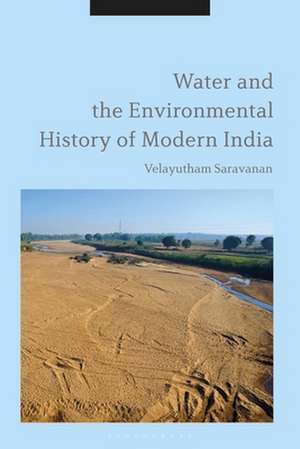Water and the Environmental History of Modern India
Autor Professor Velayutham Saravananen Limba Engleză Paperback – 28 iul 2021
| Toate formatele și edițiile | Preț | Express |
|---|---|---|
| Paperback (1) | 218.18 lei 6-8 săpt. | +71.27 lei 7-13 zile |
| Bloomsbury Publishing – 28 iul 2021 | 218.18 lei 6-8 săpt. | +71.27 lei 7-13 zile |
| Hardback (1) | 598.84 lei 6-8 săpt. | |
| Bloomsbury Publishing – 22 ian 2020 | 598.84 lei 6-8 săpt. |
Preț: 218.18 lei
Preț vechi: 275.15 lei
-21% Nou
Puncte Express: 327
Preț estimativ în valută:
41.75€ • 43.68$ • 34.68£
41.75€ • 43.68$ • 34.68£
Carte tipărită la comandă
Livrare economică 02-16 aprilie
Livrare express 26 februarie-04 martie pentru 81.26 lei
Preluare comenzi: 021 569.72.76
Specificații
ISBN-13: 9781350246737
ISBN-10: 1350246735
Pagini: 240
Dimensiuni: 156 x 234 x 19 mm
Greutate: 0.37 kg
Editura: Bloomsbury Publishing
Colecția Bloomsbury Academic
Locul publicării:London, United Kingdom
ISBN-10: 1350246735
Pagini: 240
Dimensiuni: 156 x 234 x 19 mm
Greutate: 0.37 kg
Editura: Bloomsbury Publishing
Colecția Bloomsbury Academic
Locul publicării:London, United Kingdom
Caracteristici
Huge chronological scope allows you to trace the development of this issue across modern Indian history
Notă biografică
Velayutham Saravanan is Professor and Director at the Centre for Jawaharlal Nehru Studies, Jamia Millia Islamia (Central University), India. He is the author of Environmental History and Tribals in Modern India (2018) and Colonialism, Environment and Tribals in South India, 1792-1947 (2017). He is also the editor of the History and Sociology of South Asia journal.
Cuprins
List of MapsList of TablesList of AppendicesAuthor NotePreface AcknowledgementsAcronymsMeasurements1. Introduction2. Hydrology, Commercialization and Ecology3. Population, Urbanization, Industrialization and Demand for Water4. Water Supply Schemes and Conflict5. Canal Irrigation, Technology and Conflict6. Disasters of Linking Rivers7. ConclusionGlossaryBibliographyIndex
Recenzii
Through a fascinating series of microstudies, Velayutham Saravanan's scholarship insightfully highlights the vital role of the physical environmental in modern South India. Importantly, this fine book particularly concentrates on the multiple issues of water (supply, distribution, and pollution) during the period from the late British Raj to today's independent Republic of India.
Melding agrarian history with urban history and situating industrialization within a broader socio-economic context, this sophisticated and sobering study makes water central to the writing of environmental history. Scholars and policy professionals will benefit immensely from reading this work.
[T]his book is a useful addition to the growing literature on the specificity of the historical trajectory of rivers in South Asia. In addition to previously unexplored archives, there is a wealth of statistical information here that would be useful to a wide readership, including policy makers, economists, and development studies experts.
Melding agrarian history with urban history and situating industrialization within a broader socio-economic context, this sophisticated and sobering study makes water central to the writing of environmental history. Scholars and policy professionals will benefit immensely from reading this work.
[T]his book is a useful addition to the growing literature on the specificity of the historical trajectory of rivers in South Asia. In addition to previously unexplored archives, there is a wealth of statistical information here that would be useful to a wide readership, including policy makers, economists, and development studies experts.
